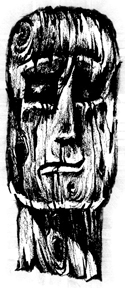As supplies of traditional musical instrument timbers diminish and become protected, many Australian and International
instrument makers are searching for replacement timbers from our native species.
The requirements of timbers to be used in musical instruments are very specific.
Generally, timbers must have a very fine, straight grain and be free of blemishes and sapwood.
They need to be very stable, and dried properly so that their pitch can be maintained.
Many Australian outback timbers meet these criteria and have the added advantage of
displaying an attractive figure and aroma.
Some of these species are suitable for particular instruments or instrument components,
depending on their acoustic, aesthetic and other features.
Already, a number of the Australian outback timbers including Mulga and Gidgee, are being used to make guitars
and other stringed instruments.
The New 2017 CITES Regulation on Rosewood
The Convention of International Trade of Endangered Species of Flora and Fauna (CITES) held a conference from September 24 - October 4, 2016 in Johannesburg, South Africa where it was decided that all species of Rosewood under the genus Dalbergia will be protected. The new regulation takes effect on January 2, 2017 that calls for documentation when shipping instruments internationally that contain any amount of any kind of Rosewood protected under CITES Appendix II.
While Brazilian Rosewood is currently under CITES protection (those laws will stay in place), this move places all the other nearly 300 species of Rosewood under similar regulation.
This includes the East Indian Rosewood and Honduran rosewood - as well as woods like Cocobolo (Dalbergia retusa) and African Blackwood (Dalbergia melanoxylon) - that are widely used in the manufacturing of stringed instruments, marimbas and some woodwinds.
instrument makers are searching for replacement timbers from our native species.
The requirements of timbers to be used in musical instruments are very specific.
Generally, timbers must have a very fine, straight grain and be free of blemishes and sapwood.
They need to be very stable, and dried properly so that their pitch can be maintained.
Many Australian outback timbers meet these criteria and have the added advantage of
displaying an attractive figure and aroma.
Some of these species are suitable for particular instruments or instrument components,
depending on their acoustic, aesthetic and other features.
Already, a number of the Australian outback timbers including Mulga and Gidgee, are being used to make guitars
and other stringed instruments.
The New 2017 CITES Regulation on Rosewood
The Convention of International Trade of Endangered Species of Flora and Fauna (CITES) held a conference from September 24 - October 4, 2016 in Johannesburg, South Africa where it was decided that all species of Rosewood under the genus Dalbergia will be protected. The new regulation takes effect on January 2, 2017 that calls for documentation when shipping instruments internationally that contain any amount of any kind of Rosewood protected under CITES Appendix II.
While Brazilian Rosewood is currently under CITES protection (those laws will stay in place), this move places all the other nearly 300 species of Rosewood under similar regulation.
This includes the East Indian Rosewood and Honduran rosewood - as well as woods like Cocobolo (Dalbergia retusa) and African Blackwood (Dalbergia melanoxylon) - that are widely used in the manufacturing of stringed instruments, marimbas and some woodwinds.


We can also custom cut to your sizes in stringed, wind and percussion instruments.
